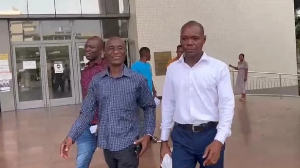The reader must forgive us for the length of this essay. We take responses to our essays and comments seriously. To that end we always strive to diligently answer questions and comments when they are civil, informative, and have the slightest capacity to put into clearer context the many important issues facing Ghanaians at home and in the Diaspora, and in which we have a Ghana-centered interest.
The 20th May Cletus D. Kuunifaa retort to our "critical thinking" essay ("Mahama's 'silent corruption' is useless vs. FOIB!") published on Ghanaweb 18th May has just been brought to our attention. Kuunifaa's response pays so little attention to the most important points in our essay the retort reads a bit like a knee-jerk reaction to our critique of Mr. Mahama's "silent corruption" diversion. Sadly, Kuunifaa distorts our essay, borrows from us without proper attribution, and ridicules our on-going effort to promote critical thinking abilities on these matters. Fact is, living in a competitive, empirically-driven, knowledge-based, and inter-dependent global age, one needs critical thinking skills to succeed in life more than ever. That goes for individuals, communities, and even nations. Foremost, this requires reading wide and critically questioning old faiths, "new" ideas, and untested assumptions, regardless of the source.
We will grant that our use of the word "exclusively" to qualify "silent corruption" as an information technology concept for "machine-errors" was a tad off-beat. Disciplines do borrow from other disciplines. However, when they do, meanings must not be contorted or reinvented to fit angular "holes" where there were round holes, at the source of the contributing discipline.
The way we see it, if a Ghanaian public servant, a technician, for instance, is hired under competitive conditions and in doing their work makes a mistake (read "makes error") that causes harm unbeknownst to the employee, that would be analogous to a "machine-error". It would not be the same as Kuunifaa's government physician who skips his/her public duties to seek private gain on the other side of town. Further, as noted in our original essay, it is not be the same as "poor execution of public-sector projects with inadequate inputs, and the supply of substandard goods...to public-sector organisations...". To that end, we suggested "Mr. Mahama ought to stop confusing public governance and management issues.....lack of training, education, adequate/timely compensation, and proper incentives for public sector employees...with deliberate criminal acts such as importation, supply, and sale of counterfeit equipment, drugs, (and theft)."
The reader will agree that high-level government officials in a health ministry who pocket "10%" of government contracts will probably have little incentive and time, certainly precious little justification, to properly supervise low-paid, half-trained technicians who are late to work sometimes, or occasionally never show up for work at all. Critical here are the scale of the infractions and the approach a rational and effective administration ought to utilize to solve the two unequal performance issues. In our opinion, administrative solutions, including training, might be relevant for the technicians. However, the actions of the "high-level government officials" would deserve higher priority, criminal prosecution, certainly. After all, don't we all know that the fish rots from the head, down?
Therefore, it is startling that Kuunifaa attempted to create the impression that we care less about corruption than Kuunifaa because we opined that Mr. Mahama's "silent corruption" is inappropriate, re-invents, and wastes the Peoples' time. To that end, Kuunifaa asks, "If corruption does not constitute a major obstacle and or alarming news for us to worry about, what else does?" But oddly, Kuunifaa answers Kuunifaa by borrowing our original statement on this one, but without proper attribution. Readers can evaluate for themselves:
Prof Lungu (from original essay): "According to a recent report by Mr. Kofi Annan's "Africa Progress Panel", Africans are losing billions of dollars (read "economic growth") annually from shady transactions that leave government officials clandestine winners, and the public the worse for them."
Kuunifaa (from the retort): "... Former Secretary General, Kofi Annan pointed out that corruption accounts for loss of several billion dollars annually from shady transactions and deals that leave government officials clandestine winners and the public the worse for them..." .
Again, Kuunifaa borrows from us without proper attribution, represents the statement as Kuunifaa's, and is self-exposed, as a result.
Interestingly, the 2012-2021 Ghana National Anti-Corruption Action Plan (NACAP) cites a 2010 World Bank study, "Africa Development Indicators: Silent and Lethal, How Quiet Corruption Undermines Africa’s Development Efforts." The report makes the point that in 2000, "leakages of non-salary cash flows in health care delivery system in Ghana amounted to 80%..." NACAP, the latest Ghana anti-corruption plan in the hands of Mr. Mahama borrows from the World Bank. NACAP notes that "Ghanaian society is also saddled with 'quiet corruption' which takes the form of absenteeism, habitual lateness for work....leakage of funds... informal user fees, petty thievery...diversion of supplies by public officers." (Read "Fighting corruption: Blueprint exists already - Short," Ghanaweb, 24 May).
Question then is, assuming Mr. Mahama is acting on the NACAP report, how do we get from "quite corruption" to machine-error "silent corruption"? Given the serious implications of the subject on the Ghana national economy and human development, this is not a trivial matter.
Yes, semantics matter a lot in public discourse, particularly when we are attempting to organize attention and prioritize responses and actions to major public issues! Relatedly, no elder, chief, public official, professor, or teacher, president, etc., ought to be beyond critique simply because they and have expressed an idea and occupy a position, or are advanced in age.
We say Kuunifaa's response to our "Mahama's 'silent corruption'" essay is a knee-jerk reaction because the writer chose to dwell on "silent corruption," and for some rather odd reason, neglected to address the "vs. FOIB" angle. As far as we are concerned, this is actually the most pertinent part of the entire critique. We do not know the reason behind Kuunifaa's glaring omission. And so, in the interest of time, we will provide a brief extract from the original article:
"...We all know that the...FOIB...is a better promise for solving many of the issues Mr. Mahama identifies in Ghana. If you care to ask us, the FOIB is a 2-prong partnership/participation lever for citizens in a democracy worth anything. Yet, Mr. Mahama and the NDC government have coolly sat on the bill going on over 5 years. Is it the case that Mr. Mahama actually does not see a link here?" Why waste the Peoples' time when there are serious consequences for so many?
Further, we said that many organizations have already done, and are continuing to do, important work exposing corruption and improving transparency and accountability. We cited in particular, "Transparency International (TI), the World Bank, Amnesty International, Global Witness, civil society organizations."At this stage, we will now include Ghana's own CHRAJ.
Why not build on all that work if you are in government, or the head of government? Sitting on FOI bill, why sit on NACAP, as well?
So, we are forced to ask hugging-Kuunifaa and Mr. Mahama what the NDC and Mr. Mahama have done, and intend to do, with respect to (1) NACAP, (2) the Freedom of Information (FOI) bill and (3) Public Disclosure of Assets (PDOA)) by government officials? Is Mr. Mahama totally committed to the struggle against corruption, kalabule, and fraud in government, or what? Consider that the 2012 Corruption Perceptions Index by TI sets Botswana, Cape Verde, Mauritius, Rwanda, and Namibia apart from Ghana, where sadly, official corruption and fraud still "remain significant obstacles" to the social and economic development and well-being of Ghanaians.
Finally, Kuunifaa protests there is no critical "thought" at bottom of our essay. This is probably not surprising. Recall that Kuunifaa doesn't even know when Kuunifaa agrees with us.
Clearly, Prof Lungu has never claimed genius status. To the point, one does not have to be genius to (1) think critically, (2) make logical arguments and (3) arrive at rational conclusions in a discourse or public forum. You only need an open mind and a willingness to think outside your bounded, subjective frame of reference.
In this particular instance, critical thinking tells us that when you borrow from a discipline, you do not corrupt. Critical thinking tells us to ask questions when public officials attempt to organize the "thoughts" of citizens to issues they want citizens to focus on, to the exclusion of others. Critical thinking tells us to focus on the major, not the minor. For instance, what is it that prevented Mr. Mahama from speaking about the FOI bill, Asset Declaration, NACAB, and instead, influenced him to spend precious time on "silent corruption"? Critical thinking tells us there is precious little Ghana needs to re-invent in many areas, including the fight to (1) control corruption, (2) pass a Ghana-centered FOI bill, and (3) institutionalize many other accountable and effective governance processes and metrics (NACAP, for instance) that can in very short order greatly contribute to the economic and social well-being of Ghanaians living today, whether they are in Zvarungu or Accra.
Again, give us the FOI bill right now! And while you are at it, let's tie it to Asset Declaration. Otherwise, we will be free to faithfully conclude that you are acting in "strange" and "misguided" ways, and as a result, squandering the Peoples' time!
Oh, yes, you guessed right! This response to Kuunifaa is as well in furtherance of our "Critical Thinking Series"!
So it goes, Ghana!
Thanks, Cletus D. Kuunifaa!
©Prof Lungu is Ghana-centered, Ghana-Proud. Prof Lungu is based in Washington DC, USA. Prof Lungu is brought to you courtesy, www.GhanaHero.com. Join us: (Email: professor.lungu at yahoo.com). (Washington DC, USA, 30th May, 2013).
Opinions of Saturday, 1 June 2013
Columnist: Lungu, Prof














